Ever felt like you were wasting time, money, and effort trying to sell your product or service to everyone but not connecting with anyone in particular?
Well, there's a more efficient way to do it: target marketing strategies!
No more guessing who might need your product or service. Instead, we focus on the people who need, want, and can afford what you offer.
In this easy-to-follow guide, we'll explain everything you need to know about target marketing strategies.
We'll examine how identifying your ideal customer and tailoring your message to their needs can help you maximize your marketing efforts.
Let's get started!
Identifying a Target Market
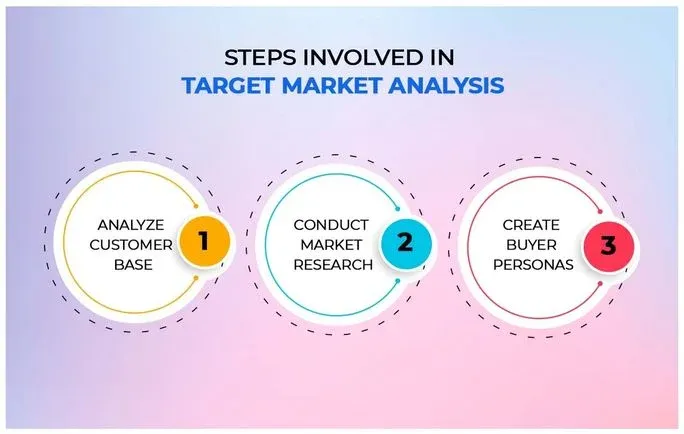
A target market is a specific group of customers who share common needs or characteristics that a business aims to serve.
Identifying the right target market for your product or service is important, as it helps businesses direct marketing efforts to the right people who are most likely to make purchases.
However, identifying a target market requires insight and data; it may lead to success if done correctly.
Demographic Analysis
Demographic analysis involves studying a population's age, gender, income, education level, and marital status.
This information helps identify products or services that are likely to appeal to that segment.
Psychographic Analysis
Psychographic analysis determines customers' values, behaviors, attitudes, and interests. This analysis enables businesses to understand customer behavior, choices, and how they must be approached.
Geographic Analysis
Geographic analysis focuses on where target audiences are located. This information allows businesses to design marketing campaigns to address location-specific challenges and opportunities.
The next step is the development of a target marketing strategy.
Developing a Target Marketing Strategy
Once the target market is identified, the next step is to develop a target marketing strategy to tailor a marketing plan that speaks to them.
Developing a target marketing strategy involves the following process:
Segmentation of Target Marketing
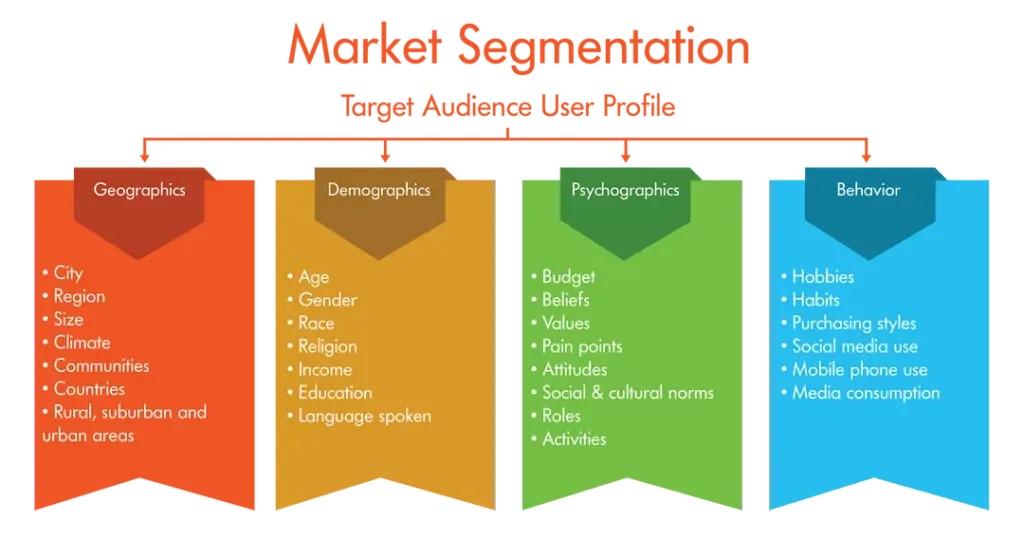
Segmentation of the target market means dividing the audience into groups according to their needs and characteristics.
Companies can segment the market using various criteria, such as demographics, psychographics, geography, and behavior.
Understanding Customer Needs
Understanding customer needs, challenges, and pain points is integral to developing an effective target marketing strategy.
The needs of the target audience drive the message through the marketing channels.
Creating Unique Selling Proposition (USP)
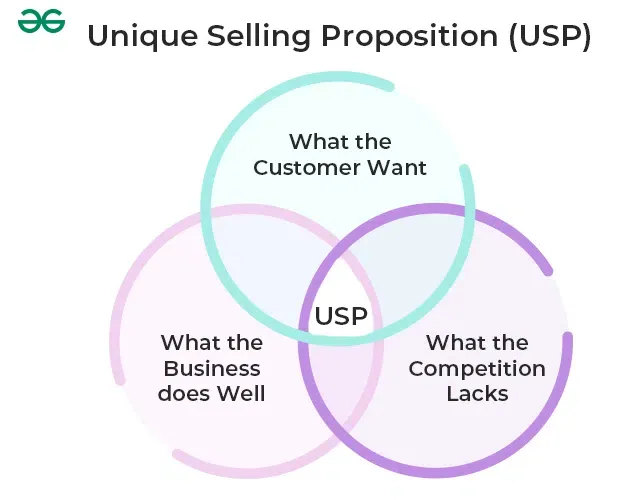
Creating a Unique Selling Proposition (USP) that reflects the target audience's needs helps businesses stand out from their competitors. It communicates the value proposition to the potential customers.
Positioning
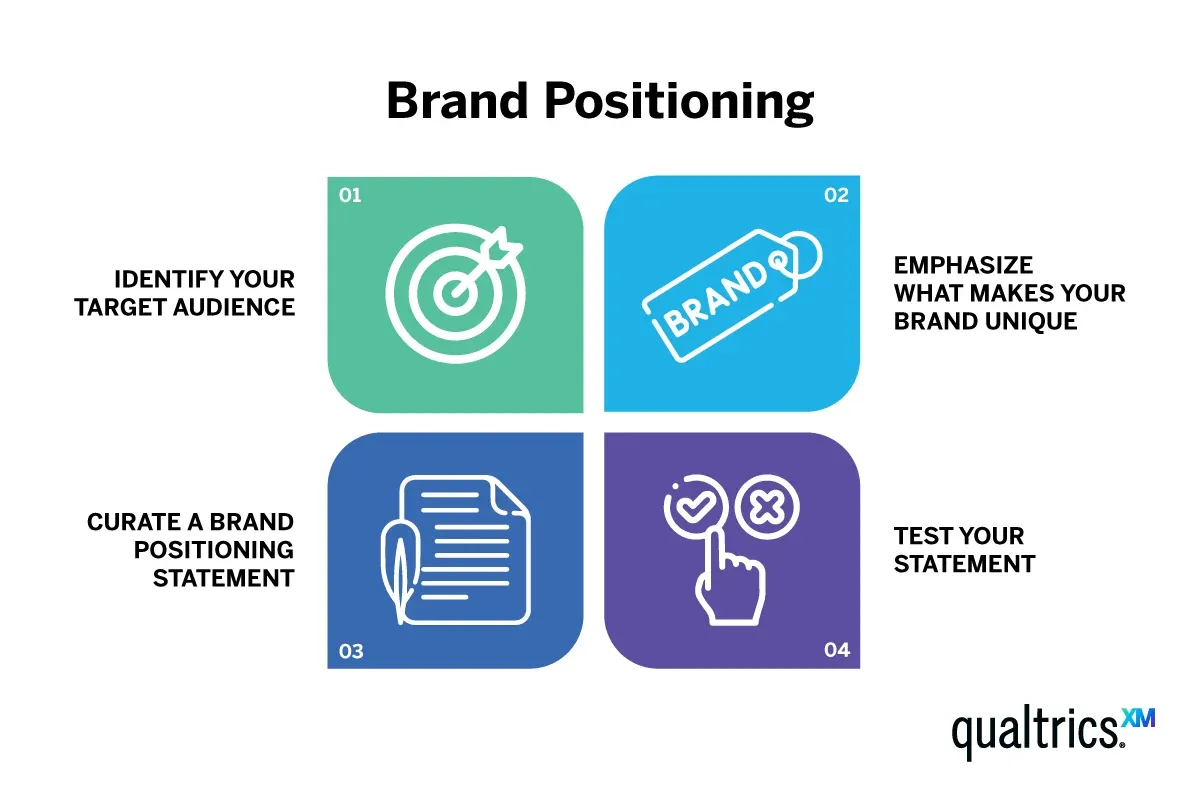
Positioning refers to creating a positive perception of the brand in the minds of potential customers.
By understanding the target audience's attitudes, behavior, and preferences, companies can differentiate themselves from competitors.
Now, we will see types of Target marketing strategies
Types of Target Marketing Strategies
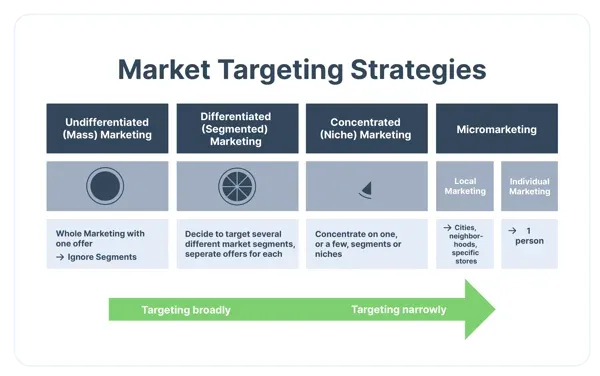
After defining the target audience and developing a Target marketing strategy, businesses can apply these target marketing strategies to reach their desired audience.
Demographic Targeting
Demographic targeting focuses on targeting a particular demographic category, such as age, gender, or income.
This target marketing strategy requires businesses to appeal to these distinct groups' interests, preferences, and values.
Psychographic Targeting
Psychographic targeting revolves around individuals' personalities, values, beliefs, and behaviors.
This tactic requires businesses to understand customer emotions, aspirations, and attitudes in order to appeal to them.
Geographic Targeting
Geographic targeting involves using specific location data to reach out to people in a particular geographical area.
Target marketing strategy is handy for businesses that cater to location-specific consumer needs.
Behavioral Targeting
Behavioral targeting involves targeting customers based on their past purchasing behavior, online activity, and search history.
This tactic leverages data for personalized targeting, making advertisements more relevant to the consumer.
Now we will see the benefits of Target marketing strategies.
Suggested Reading:
Benefits of Target Marketing Strategies
Target marketing strategies provide numerous benefits for businesses, including:
More Effective Than Mass Marketing
Target marketing enables businesses to create and tailor unique, relevant advertising that connects with consumers' needs.
This results in a more effective marketing campaign than mass marketing, which does not address the consumer's specific needs.
Increased Customer Loyalty
Targeted marketing demonstrates that a business understands its customers' needs, thereby creating a bond of trust and loyalty between the business and its target audience.
Better Return on Investment (ROI)
Targeted marketing campaigns are a better Return on Investment than mass marketing. Since these campaigns narrow down the target, businesses can save on advertising costs, leading to a higher ROI.
Enhanced Brand Image
Targeted marketing campaigns establish the company's brand image with the ideal target audience.
This connection establishes a positive image that enables the business to stand out from its competitors.
And implementing effective marketing strategies sometimes includes doing things your competitors are not doing.
For example, consider making the most out of your CRM by integrating it with an AI chatbot. And what good does it bring to your business?
Take the case of ‘Retargeting’. To implement effective retargeting you need two things: A well-integrated CRM and an effective bulk message sender.
By integrating a CRM with your chatbot you can set up drip campaigns and send bulk messages on platforms that are convenient for your customers.
And beginning with such automation isn't that tough either. Meet BotPenguin- the home of chatbot solutions.
With the combined benefits of CRM and Chatbots, BotPenguin makes automation services like lead generation and customer support more effective by unifying marketing and sales efforts in one place:
- Marketing Automation
- WhatsApp Automation
- Customer Support
- Lead Generation
- Facebook Automation
- Appointment Booking
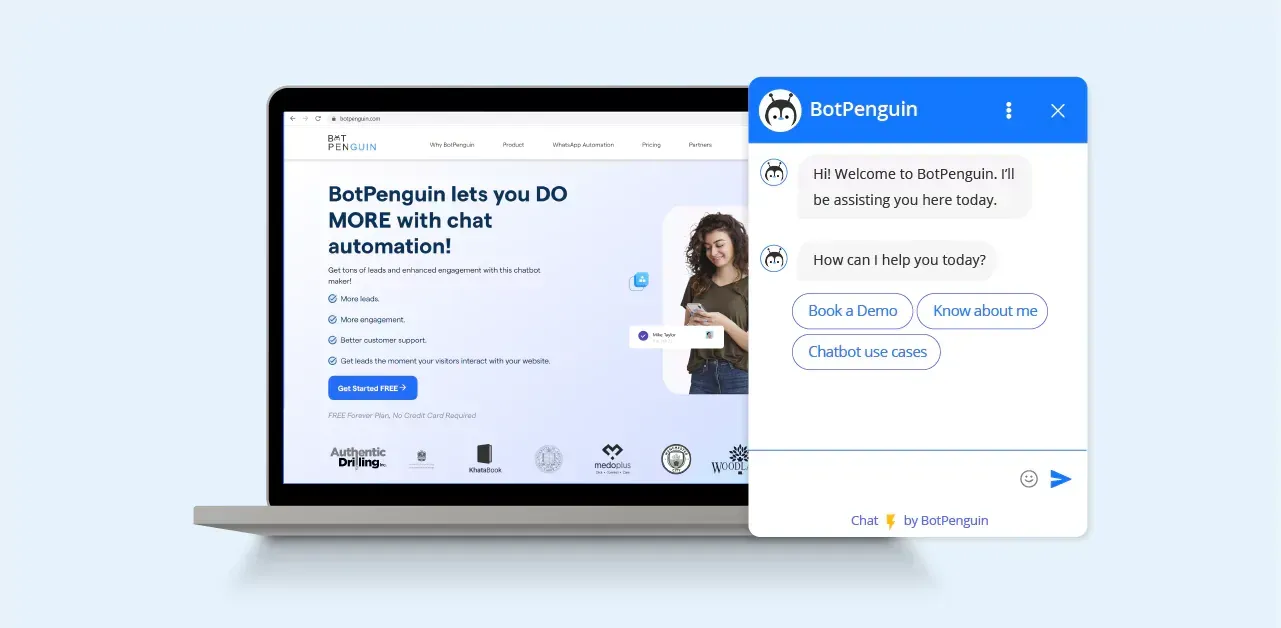
Challenges of Target Marketing Strategies
Despite being a powerful tool for businesses, there are several challenges associated with target marketing strategies, including:
Cost of Developing Target Marketing Strategies
Developing targeted marketing campaigns requires significant planning and investment, which can be costly. This cost can allow companies to implement these campaigns.
Misinterpreting the Target Market
Businesses can misinterpret the target market, leading them to develop irrelevant content for the audience. As a result, the targeted campaign fails, and the business misses growth opportunities.
Changes in Target Market Preferences
Target markets continually evolve, with shifting behaviors, values, and needs. This makes it challenging for businesses to stay up to date with their target audience's identification and demands.
Suggested Reading:
Steps to Implementing Target Marketing Strategies
To successfully implement target marketing in a business, companies should follow these steps,
From identifying and analyzing the target market to marketing mix elements. Read on to learn the steps.
Identify and Analyze the Target Market: Start by identifying and analyzing the specific group of customers that the business aims to serve. This involves studying their demographics, psychographics, and geographic location. Analyzing the target market helps determine if the audience is viable and profitable.
Define the Unique Selling Proposition (USP): Determine the unique features and benefits that the business provides to the target audience. This is what sets the business apart from its competitors and forms the basis of its value proposition.
Establish Objectives and Set Goals: Clearly define the objectives and goals the business aims to achieve through its target marketing strategy. This provides a focus and helps measure the success of the campaign.
Marketing Mix Elements: Decide on the optimal mix of the four Ps of marketing - product, price, promotion, and place. Ensure that the product or service being offered aligns with the needs and preferences of the target audience. Set the right price, develop appropriate promotional strategies, and choose the most effective channels to reach the target market.
By following these steps, businesses can develop and implement target marketing strategies that effectively cater to the needs of their specific audience, leading to increased customer loyalty, sales, and a better return on investment.
Last but not least, let us measure the effectiveness target marketing strategies.
Measuring the Effectiveness of Target Marketing Strategies
For businesses to stay competitive, they need to measure the effectiveness of their target marketing strategies.
Key performance indicators are used to track the progress of these campaigns, and businesses can use several methods to measure these KPIs, including:
Web Analytics
Web analytics provide valuable data on customer behavior, website traffic, and conversion rates.
Surveys
Surveys allow businesses to gather feedback from their target audience, providing insights into how to improve their marketing strategy.
Customer Feedback
Customer feedback provides relevant insight into the target audience's needs and preferences, guiding businesses in designing and executing effective marketing campaigns.
Conclusion
Targeted marketing is essential for business growth, but executing an effective strategy requires insight and precision.
This guide outlined proven methods to identify, analyze, and serve your ideal customers. You learned techniques to segment audiences, create compelling positioning, optimize marketing mix elements, and measure campaign ROI.
Now put these target marketing best practices into action with chatbots built on BotPenguin.
Our intuitive platform makes it easy to create customized bots that engage precise consumer niches.
Drive traffic, boost conversions, and skyrocket customer loyalty through AI-powered conversations scaled for your goals.
See for yourself with BotPenguin’s free trial—build bots that captivate your target market in just minutes with no coding.
Visit BotPenguin.com to turn target marketing theory into results-driven chatbot reality today!
Suggested Reading:
Frequently Asked Questions (FAQs)
How does target marketing help businesses reach the right customers?
Target marketing strategies identify specific market segments based on demographics, psychographics, and geographic factors, allowing businesses to tailor their marketing efforts to reach the most relevant audience.
What are the benefits of implementing target marketing strategies?
Target marketing strategies lead to more effective marketing campaigns, increased customer loyalty, better return on investment, and an enhanced brand image.
What are the key steps involved in implementing target marketing strategies?
The key steps include identifying and analyzing the target market, defining a unique selling proposition, establishing objectives and goals, and deciding on the optimal marketing mix elements.
What types of target marketing strategies can businesses use?
Businesses can use demographic, psychographic, geographic, and behavioral targeting to reach and engage their desired audience effectively.
How can businesses measure the effectiveness of their target marketing strategies?
Businesses can measure effectiveness through web analytics, surveys, and customer feedback to track customer behavior, gather insights, and make data-driven improvements to their target marketing campaigns.



